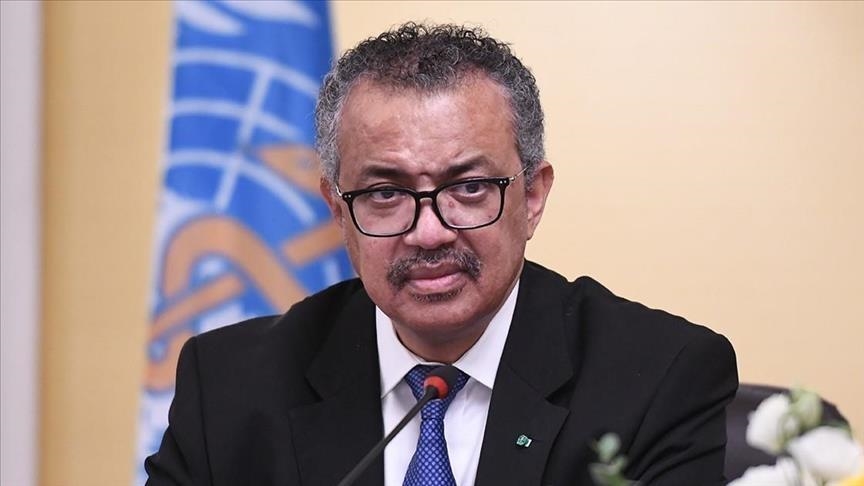WHO chief urges adoption of pandemic accord, warns of Gaza famine risk, funding crisis
At 78th World Health Assembly, Tedros says 'Member States will consider, and hopefully adopt, the WHO Pandemic Agreement. This is truly a historic moment

- He reveals $1.7B funding gap despite 60% of WHO budget already secured
GENEVA
The World Health Organization's (WHO) chief urged member states on Monday to adopt the long-negotiated pandemic agreement, warning of deteriorating humanitarian conditions in Gaza, a funding crisis at the WHO, and the resurgence of polio in some parts of the world.
"Every World Health Assembly is significant, but this year’s is especially so," WHO Director-General Tedros Adhanom Ghebreyesus said at the opening of the 78th World Health Assembly in Geneva. "At this Assembly, member states will consider, and hopefully adopt, the WHO Pandemic Agreement. This is truly a historic moment."
After more than three years of negotiations, World Health Organization (WHO) member states reached a milestone in pandemic preparedness by finalizing a draft pandemic agreement on April 16.
Describing the development as a mixture of "joy, triumph, relief, exhaustion," he said: "I look forward to your adoption of the agreement."
Turning to humanitarian emergencies, Tedros issued a stark warning about the situation in Gaza, where the WHO recently negotiated a humanitarian pause to vaccinate over 560,000 children for polio.
Risk of famine in Gaza increasing with 'deliberate withholding' of aid
Two months into the latest blockade, two million people are starving, while 116,000 tonnes of food are blocked at the border, Tedros said.
He lamented that people are dying from "preventable diseases as medicines wait at the border, while attacks on hospitals deny people care, and deter them from seeking it."
"The risk of famine in Gaza is increasing with the deliberate withholding of humanitarian aid, including food, in the ongoing blockade," he said. "Increasing hostilities, evacuation orders, shrinking humanitarian space, and the aid blockade are driving an influx of casualties to a health system that is already on its knees."
He confirmed that WHO has supported medical evacuations of over 7,300 patients, including 617 cancer patients, but added that more than 10,000 patients still require medical evacuation from Gaza.
Tedros also highlighted other conflicts, saying that in Sudan, an estimated 32,000 people have been killed, 30% of the population has been displaced, and 20 million people require humanitarian assistance.
In terms of health achievements, Tedros announced several major milestones, including Egypt and Georgia becoming malaria-free in the last year, and Botswana becoming the first country to achieve gold tier status on the path to eliminating HIV transmission from mother to child.
He also warned about setbacks, pointing out that the number of polio cases detected in Pakistan and Afghanistan increased from 12 in 2022 to 99 last year. Ten cases have been reported this year, he said.
Salary gap for next biennium
The WHO chief devoted a significant part of his speech to the agency's financial struggles.
"We are facing a salary gap for the next biennium of more than $500 million," Tedros said, adding that this has forced a reduction in the workforce.
"This week, you will consider a reduced program budget of $4.2 billion for the 2026-2027 biennium," he said, down from the original proposal of $5.3 billion.
"Assuming you approve the increase in assessed contributions, and thanks to the Investment round, we are confident that we have already secured more than $2.6 billion, or 60% of the funding for the next biennium," he said. "That leaves an anticipated budget gap of more than $1.7 billion."
He described the funding shortfall as a misalignment of global priorities, saying:"$2.1 billion is the equivalent of global military expenditure every eight hours; $2.1 billion is the price of one stealth bomber."
In his concluding remarks, Tedros cited a 1951 quote from India's first Health Minister, Rajkumari Amrit Kaur: "The dark clouds that overshadow our skies today can - and must - be dispelled by our part of the pledge to serve one another."
Anadolu Agency website contains only a portion of the news stories offered to subscribers in the AA News Broadcasting System (HAS), and in summarized form. Please contact us for subscription options.







